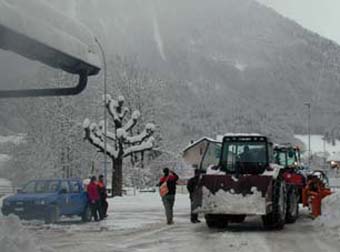LETTERS FROM THE COUNTRY:
 |
The few falls of snow between November and the
end of January which each melted before the arrival of the next were deemed
insufficient. Even the older inhabitants of the village wished for more
snow, a good covering as in their youth came every year. The last Tuesday
in January we had rain which turned to snow after dark. The snow continued
to fall without interruption until Friday afternoon. It fell particularly
densely during the afternoons. Men worked hard to keep the roads open.
A flock of choughs invaded the nearest town and called out from the tallest
trees and the rooftops. The deer came out of the forests to graze in the
snow covered pastures. |
Saturday morning dawned fine.
Our access road to the rest of the world was jammed with the cars
of people going skiing. The downhill skiing starts twenty kilometres from
us, at a thousand metres above sea level. Here there is just a small lift
for the use of local families and slopes in the fields and gardens are
used for the children to sledge and learn to ski. The snow on the only
ski slope had just about worn away when snow came again, just in time for
Wednesday afternoon when the village school is closed. Once again we had
nearly three days of falls and it was impossible to keep the village streets
safe for walking.
The ski stations at moderate altitude were delighted. Their financial
viability has been put in doubt by the absence of sufficient snow for four
years running. The dilemma of tourism is now more widely debated. The villages
which have adopted mass tourism as a means to more income have to put on
special events to attract visitors. But here, as in many mountain valleys
which are not main through routes (there problems are of a different nature),
the road and single track railway cannot cope and sooner or later a serious
incident will demonstrate that in these circumstances emergency services
cannot get through. How can tourism contribute to local incomes without
ruining the beauty and tranquillity which some tourists seek? How can locals,
many of whom have lived in the same valley, village, or farmhouse for generations
enjoy reasonable amenities which will keep them here while mountain farming
becomes relatively less profitable?
The problems of the dairy industry were aired on our television recently.
We learnt that the quality requirements for milk for the famous local cheese
are higher than those for 'industrial' milk, which ends up as milk in cartons
and the wide range of milk products in supermarkets. The farmers are no
longer allowed to keep large muck heaps in the middle of the village which
will ultimately drain into the ground water. To make new investments worthwhile
the herd must be nearer to fifty than thirty cows. The farmers sell up.
There is a pool of labour, not specifically skilled, but used to doing
all the multiple tasks necessary on a farm including keeping the machinery
running. The men of the mountains are adaptable. Some have taken up successfully
specialist farming. A job in the town, if available, will be less varied,
give them less independence but probably better living standards, as they
keep their family home, and less risk and worry. Others refuse another
idea, that country people should become park keepers for the benefit of
the town dwellers. After all the form the countryside has today is not
the result of nature in the raw but the work of generations of men and
women seeking to make a living, but often with a great respect for the
beauty of the land and love and sympathy for the beasts they reared.